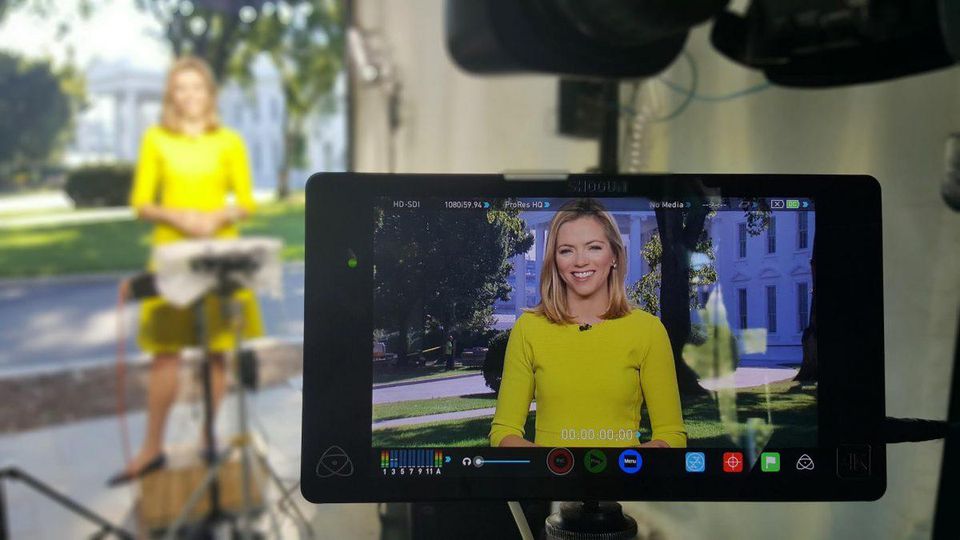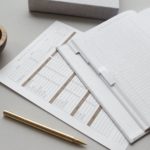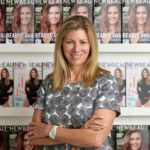Kayla Tausche has already read multiple newspapers, checked her emails, scanned social media and reported on breaking news before 6 a.m. (I am likely still asleep dreaming about an almond milk latte.) As an on-air correspondent based at CNBC’s Washington, D.C. bureau, Tausche focuses on the intersection of government and business. She joined CNBC in 2011 as a general assignment reporter covering corporate finance and deals for CNBC’s Business Day programming, including reporting on a wide range of high-profile stories for the network like the Facebook initial public offering, the Occupy Wall Street movement and the News Corp. phone hacking. Last year, Tausche moved to D.C. to cover the White House and Capitol Hill. We spoke about her career advice for other journalists and her experience covering the Trump White House.

How did you end up at CNBC? What was your career path?
I’d always wanted to be a print journalist and held a variety of editorial jobs during college at the Associated Press and Bloomberg News. After graduating, I worked for a small hedge fund newsletter then owned by the Financial Times. I was able to break a lot of news during the financial crisis, and a few scoops, in particular, caught the eye of CNBC. After appearing in regular guest segments for about six months, CNBC invited me to jump over to television. That was seven years ago.
What is a workday as like? Please walk me through a day!
The only consistency between workdays is that I’m plugged in from start to finish. I wake up reading emails, scanning Twitter and pinging sources and go to sleep doing the same. In between, there are meetings, briefings and the potential for dozens of liveshots from any number of locations around town.
February marks your first year in D.C. What drove your decision to leave your job as an anchor in New York City to instead work as a correspondent in the field covering the White House?
Journalists are always drawn to the biggest story around — last year, that story became the White House. I’d spent a year in London and eight years in New York and was excited about a change of pace and scenery. Luckily, I haven’t had to leave anchoring behind completely — I still get back to New York to fill in fairly regularly.
What are your responsibilities as a Washington correspondent at CNBC?
CNBC airs live from 5 a.m. ET to 6 p.m. ET in the United States, so my most basic responsibility is to be ready to go live with any news coming out of the White House and Capitol Hill. Beyond that, I try to book interviews with newsmakers to move the policy conversation forward and to break news on CNBC first so our viewers can make early, informed investment decisions. In the last two weeks alone, we broke the news of the spending levels in the bipartisan budget deal and the size of recommended steel and aluminum tariffs.
Outside of breaking news, I try to pitch feature stories regularly to explore how developments in Washington are reverberating outside the beltway. How do policy changes affect people and companies? That’s a question we’re constantly asking.
What has been the most challenging thing about covering government?
There is so much happening at once that it can feel like drinking from a fire hose. On any given day you have the president tweeting, the market moving, members of Congress making legislative decisions, the special counsel’s office plugging forward and pre-scheduled news events getting overshadowed by growing scandals. It can feel like a full-time job just to stay on top of the news, much less in front of it.
What is your best advice for someone who hopes to be an on-air journalist?
Become an expert and build a network. News unfolds in a matter of seconds — you won’t have time to bone up on information before being asked to comment on it, and having knowledgeable contacts to help put things in context is critical. Five close, plugged-in sources who will respond to you at a moment’s notice are more valuable than 50 who are out of the loop.
What are the most important characteristics someone needs to have to be successful in your role?
It helps to be organized and to be an expert multi-tasker — two areas where I’m still a work-in-progress. Being able to juggle the 30-second news hit with five minutes notice and the long-form documentary a year in the making is essential.
Also, always have multiple phone and computer chargers on-hand!
What’s the biggest lesson you learned at work and how did you learn it?
You have to be proactive because people won’t find you in the woodwork. I’ve had to re-learn this over the years, but it especially became pertinent when I moved to D.C. I began cold-calling and emailing strangers I wanted to get to know in my reporting. The feeling of being a nuisance fades when you realize how many people have stories they want to tell and views they want to share — and are thankful to have an outlet through which to do so.
It also helps to be (politely) proactive within your own organization. Earlier this year, I raised my hand for an assignment for which I knew other colleagues of mine were already being considered. A mentor told me, memorably, “Make them tell you no.” They said “yes” instead.
What is one thing that you wish you had known when you were starting out your career?
Don’t sweat the small stuff. In live television, you will make mistakes, and dwelling on it will keep you from growing past it. It wasn’t until I watched seasoned anchors slip up on the teleprompter that I was able to relax and be myself on TV.
What is the best advice you’ve ever received?
Create measurable goals for yourself as best you can. Figure out markers you want to hit in a week, a month, a year and five years. Television news moves at a breakneck speed, and if you’re not careful, you can spend years simply moving from deadline to deadline without achieving the things you want.
What is your career advice for other young professional women?
Prepare for everything, whether it’s a 10-minute phone call with a producer, a quarterly talk with your boss or a conference panel. Make your communications efficient and goal-oriented.
Also, become well-read in subjects outside your wheelhouse. You never know when you’ll get asked to step up to the plate, and you surely won’t have time to cram when it happens.































